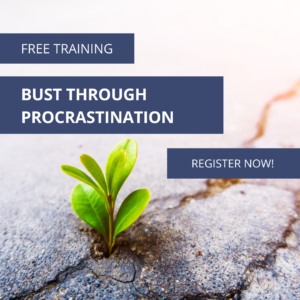You make thousands of decisions every day. Most of them are small. Should I stay in this lane or try to merge into that lane? Sign this email with “sincerely” or “warmly”? Work on this project or that project next? Follow up with that prospective client today or wait until tomorrow? What can I cut from this to-do list in order to get home in time for dinner? And what am I going to make for dinner, anyway?
When you’re well-rested, fueled, energized and have a time management system in place that’s working for you, you can make a lot of those kinds of decisions quickly and confidently so you don’t waste time second-guessing yourself. Having a plan for how you’re going to use your time each day creates a framework that helps you easily make choices about what to do next. It’s still a lot of work, all that decision making. But you can reach the end of the day feeling good about everything you did.
The problem, of course, is that a lot of people aren’t feeling well-rested, fueled and energized right now. They’re burned out. And it’s at least partly because they’re overwhelmed by having to make too many decisions.
Decision fatigue is an enemy of time management and productivity.
Busy professionals were already being burned out by decision fatigue long before COVID, but the pandemic obviously raised the stakes. We’ve spent nearly two years now making hundreds of COVID-related decisions each day, on top of everything else. Balancing a desire to stay healthy and a desire to go back to “normal” has made once-simple choices into agonizing ones. (Deciding whether to take a weekend trip or let your kid go to a birthday party was never so fraught before the pandemic!)
Decision fatigue can actually get worse when COVID cases drop.
Now that mask mandates are ending in a lot of places, more people are free to make their own decisions about where and when to wear a mask. For some people, those choices are easy. But for a lot of us, that freedom also means making more decisions.
Maybe you’re no longer required to wear a mask at the gym now. You get to evaluate the scenario and your own personal risk level to make the decision for yourself. When there was a mask mandate in place, you’d simply pull on a mask and start stretching. Now you might run through a dozen questions before walking into the gym, like:
- Are you comfortable exercising on the treadmill without a mask?
- What about in a group class?
- How will you feel if no one else in the class is wearing one?
- What if everyone else is wearing one?
- How many people are in the class?
- What if you’re personally comfortable going without a mask, but you’re going to be seeing an elderly relative in a few days and you’re trying to be extra cautious?
After weighing all that, you might decide to wear a mask to the class. When you get to the grocery store after the gym, you might run through another list of pros and cons to decide whether you’re going to wear a mask there too.
As professionals, we also have to balance our own decisions with respecting our clients’ and colleagues’ decisions. Maybe you’re fine going without a mask at a meeting, but you’re not sure whether your client is. Should you walk in wearing one, or not? Should you ask her preference or not say anything?
It’s no wonder that so many people have been feeling like they’ve hit the wall with time management and productivity recently.
All those little decisions add up. It’s overwhelming, doing all that mental calculus before every errand and every interaction—especially when you’re already being pulled in so many directions. By the time you get to the end of that kind of decision-heavy day, you’re going to be too wiped out to enjoy your relaxation time or plan for the next day.
You have a limited amount of time and mental energy in a day. The more resources you spend weighing pros and cons and making decisions, the fewer resources you have to spend on your most important tasks. The less time you have to spend on working toward the personal and professional goals that you set for yourself this year.
When decision fatigue strikes, you need a simple way to break through that overwhelm so you can move forward with your most important tasks.
Three Tips for Defeating Decision Fatigue
- Try asking yourself: Where do I want to point my personal compass right now? It’s a simple question that may help you refocus your energy on your peak priorities. Instead of being bogged down by second-guessing past decisions or feeling overwhelmed in the present, thinking about where your compass is pointed gets you focused on the future and forward movement. Where do you want to be going? What would feel gratifying to focus on next?
- Build in break time. When you’re completely overwhelmed, trying to push through and keep going can be like trying to get a saturated sponge to soak up more water. You need a chance to step away and let your brain reset. Have a flexible daily plan that includes time for short breaks so you can walk around the block, grab a snack, pet the dog or do some other low-decision activity without feeling like you’re falling behind at work.
- Prioritize physical and emotional well-being. Taking care of your sleep, exercise, nutrition and mental health needs has to be a priority no matter what’s going on around you. These needs tend to slide when we’re overwhelmed. Take a few minutes to think about a few specific things you can build into your daily plan. Do you need 30 more minutes of sleep? A daily commitment to morning meditation so you start the day feeling centered? If you set goals around health and wellness back in January, it’s okay if you haven’t kept up with them yet—but revisit them now.
And Remember: You’re Not Alone.
If you’re struggling with overwhelm and poor time management and feeling like you just can’t get it together, I want you to know that a lot of other people are in the same boat. Be gentle with yourself as you move forward, and remember that there’s a huge community out there to support you.
Last chance to get continued support for 90 days! Ongoing support is one key to breaking through time management challenges, and Time Matters Boot Camp 90-Day program provides exactly that. Over the course of the program, you’ll learn to customize your own time management tools to help you achieve your most meaningful goals and take control of your time.
Click here for more information and to make an appointment with me to register.
Gratefully,
Sarah



